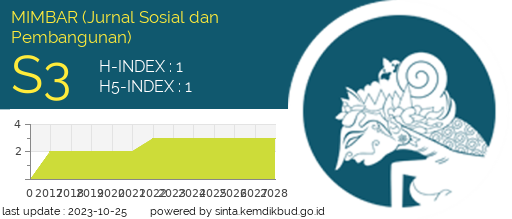Economic Capacity and Development Strategies for Arfak Tribe Farmers in Manokwari, West Papua
DOI:
https://doi.org/10.29313/mimbar.vi.3208Keywords:
Arfak Tribe Farmers, Economic Capacity, Well-beingAbstract
This study was carried out to examine the economic well-being and capacity of Arfak Tribe farmers in Manokwari, West Papua. It focused on investigating the factors influencing economic capacity in the context of the 2011–2016 Manokwari Medium-Term Regional Development Plan (RPJMD), which aimed at poverty reduction. Furthermore, the descriptive analysis, differential tests, and regression analysis were used to compare the economic conditions between Arfak Tribe and non-Papuan farmers. The results showed significant disparities, where non-Papuan farmers enjoyed higher income, skills, capabilities, greater access to agricultural technology, adequate capital and work ethic compared to Arfak Tribe. Cultural factors and social capital had a significant negative impact on the income and savings levels. These results emphasized the importance of targeted assistance to strengthen the knowledge and skills of Arfak farmers. The effective use of financial assistance from the central and regional governments supported the economic development of this indigenous local community. Targeted assistance and financial support improved the situation for Arfak farmers, addressed the systemic issues such as unequal access to resources and opportunities that perpetuated poverty. In conclusion, this study provided valuable insights on policy interventions used to improve well-being and economic empowerment of indigenous local farmers.
References
Asmuruf, M. A., Purwanto, R. H., & Faida, L. R. W. (2017). Rehabilitasi Hutan Dan Lahan Berdasarkan Kearifan Lokal Suku Moile Dan Suku Meyah Di Kabupaten Manokwari Provinsi Papua Barat. Jurnal Manusia Dan Lingkungan, 24(3), 141. https://doi.org/10.22146/jml.23043
Bahta, S., Wanyoike, F., Katjiuongua, H., & Marumo, D. (2017). Characterisation of food security and consumption patterns among smallholder livestock farmers in Botswana. Agriculture and Food Security, 6(1), 1–11. https://doi.org/10.1186/s40066-017-0145-1
Duggan, R. A. (2008). A Model for International Border Management Systems. Sandia National Laboratories, September, 1–29. http://www.osti.gov/bridge%0Ahttp://www.ntis.gov/help/ordermethods.asp?loc=7-4-0#online
Hellin, J., Lundy, M., & Meijer, M. (2009). Farmer organization, collective action and market access in Meso-America. Food Policy, 34(1), 16–22. https://doi.org/10.1016/j.foodpol.2008.10.003
Huda, N., Wibowo, A., & Winarno, J. (2021). Pengembangan Kapasitas Kelompok Tani dalam Penerapan Pertanian Terpadu di Nglebak, Karanganyar. AgriHumanis: Journal of Agriculture and Human Resource Development Studies, 2(2), 143–154. https://doi.org/10.46575/agrihumanis.v2i2.102
Iyai, D. A., Marani, O., Marjen, T., & Usior, L. (2013). Pig farming performances of three papuan tribes: Case study of byak, onate and arfak tribes in Papua Barat. Journal of the Indonesian Tropical Animal Agriculture, 38(1), 55–64. https://doi.org/10.14710/jitaa.38.1.55-64
Juanda, B. (2009). Ekonometrika Pemodelan dan Pendugaan. IPB Press.
Karman. (2015). Konstruksi realitas sosial sebagai gerakan pemikiran (sebuah telaah teoritis terhadap konstruksi realitas Peter L. Berger). Jurnal Penelitian Dan Pengembangan Komunikasi Dan Informatika, 5(3), 11–23.
Marbun, D. N. V.D., Satmoko, S., & Siwi Gayatri. (2019). Peran Penyuluh Pertanian dalam Pengembangan Kelompok Tani Tanaman Hortikultura di Kecamatan Siborongborong, Kabupaten Tapanuli. Jurnal Ekonomi Pertanian Dan Agribisnis, 3(3), 537–546. https://doi.org/10.21776/ub.jepa.2019.003.03.9
Marwa, J., Sineri, A. S., & Hematang, F. (2020). Biecological Carrying Capacity of Forest and Land in Manokwari Regency, West Papua Province. Jurnal Sylva Lestari, 8(2), 197. https://doi.org/10.23960/jsl28197-206
Miles, M. B., & Huberman, A. M. (2015). Qualitative Data Analysis (terjemahan). UI Press.
Nainggolan, D. I., Dampa, D., & Palinggi, Y. (2022). Jurnal Sosio Agri Papua Vol 11 No 1 Juni 2022. 11(1), 7. files/806/228786408.pdf%0Afiles/792/Nainggolan et al. - 2022 - Jurnal Sosio Agri Papua Vol 11 No 1 Juni 2022.pdf
Prasetyono, D. W. (2019). Pengembangan Kapasitas Kelembagaan Kelompok Tani Sebagai Pilar Pemberdayaan Petani. Prosiding Konferensi Nasional Pengabdian Kepada Masyarakat Dan Corporate Social Responsibility (PKM-CSR), 2, 1285–1293. https://doi.org/10.37695/pkmcsr.v2i0.458
Prayogi, R., & Danial, E. (2016). Pergeseran Nilai-Nilai Budaya Pada Suku Bonai Sebagai Civic Culture Di Kecamatan Bonai Darussalam Kabupaten Rokan Hulu Provinsi Riau. Humanika, 23(1), 61. https://doi.org/10.14710/humanika.23.1.61-79
Pujiriyani, D. W. (2022). Deagrarianization Problem and The Implications on Agricultural Policy in Indonesia. MIMBAR : Jurnal Sosial Dan Pembangunan, 10, 275–284. https://doi.org/10.29313/mimbar.v0i0.9415
Radcliffe, C., Parissi, C., & Raman, A. (2016). Valuing Indigenous Knowledge in the Highlands of Papua New Guinea: A Model for Agricultural and Environmental Education. Australian Journal of Environmental Education, 32(3), 243–259. https://doi.org/10.1017/aee.2016.19
Raharto, S. (2016). Institutional Development Model Cocoa Farmers in East Java Province District Blitar. Agriculture and Agricultural Science Procedia, 9, 95–102. https://doi.org/10.1016/j.aaspro.2016.02.131
Rani Pundir, & Ajay Surana. (2016). Constructivism Learning: A Way to Make Knowledge Construction. International Journal of Indian Psychology, 3(2). https://doi.org/10.25215/0302.190
Reincke, K., Vilvert, E., Fasse, A., Graef, F., Sieber, S., & Lana, M. A. (2018). Key factors influencing food security of smallholder farmers in Tanzania and the role of cassava as a strategic crop. Food Security, 10(4), 911–924. https://doi.org/10.1007/s12571-018-0814-3
Shiferaw, B. A., Okello, J., & Reddy, R. V. (2009). Adoption and adaptation of natural resource management innovations in smallholder agriculture: reflections on key lessons and best practices. Environ Dev Sustain, 11, 601–619.
Sianipar, J. E., Hartono, S., Hutapea, R. T., Badan, S., Pertanian, L., Ekonomi, S. P., Ugm, P., Balitka, P., & Litbang Pertanian, B. (2013). Analisis Ketahanan Pangan Rumah Tangga Tani di Kabupaten Manokwari. Sepa, 8(2), 68–74. http://agribisnis.fp.uns.ac.id/wp-content/uploads/2013/10/03-Jeffry-E-Sianipar-Slamet-H.-Ronal-Tp-Hutapea-Analisis-Ketahanan-Pangan-Rumah-Tangga-Tani-Di-Kabupaten-Manokwari.pdf
Tapi, T., Kurnia, G., Setiawan, I., & Sumule, A. (2020). Shifting Cultivation of Arfak Farmer in Somi and Indisey Villages. MIMBAR : Jurnal Sosial Dan Pembangunan, 36(1), 175–185. https://doi.org/10.29313/mimbar.v36i1.5610
Tapi, T., & Makabori, Y. Y. (2021). Program Pembangunan Kampung: Perspektif Fungsional dan Konflik dalam Konstruksi Sosial Masyarakat Suku Arfak di Kabupaten Manokwari. Jurnal Triton, 12(2), 27–37. http://jurnal.polbangtanmanokwari.ac.id/index.php/jt/article/view/204%0Ahttps://jurnal.polbangtanmanokwari.ac.id/index.php/jt/article/download/204/177
Turua, U., Hadi, S., Juanda, B., & Murniningtyas, E. (2014). Ekologi Dan Budaya Petani Asli Papua Dalam Usahatani Di Kabupaten Keerom. Sosiohumaniora, 16(3), 234. https://doi.org/10.24198/sosiohumaniora.v16i3.5762
Wambrauw, L. T., Martin, S., & Addison, R. (2019). The Nature of Papuan Women Indigenous Entrepreneurship in Informal Agricultural Sector (A Case of Papuan Women Traders in Manokwari and Surrounding Areas of West Papua- Indonesia). Salasika, 2(1), 77–94. https://doi.org/10.36625/sj.v2i1.26
Yaku, A., Trirbo, D., Siahaenenia, A., Taberima, S., Iyai, D. A., & Monim, H. (2019). Sustainable gardening management in the Arfak farmer tribe at Kabupaten Pegunungan Arfak, Province of Papua Barat. Agrika, 13(2), 101–115. https://publishing-widyagama.ac.id/ejournal-v2/index.php/agrika/article/view/993/984
Downloads
Published
Issue
Section
License
Copyright (c) 2024 Triman Tapi

This work is licensed under a Creative Commons Attribution-NonCommercial-ShareAlike 4.0 International License.














